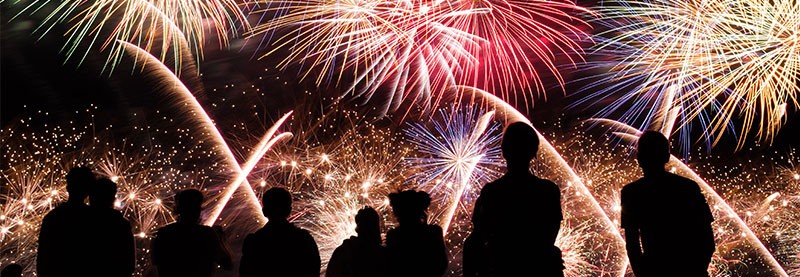Intellectual Property Insights from Fishman Stewart
Mini Article – Volume 23, Issue 12
Share on Social

Copyright and Fireworks
By Kristyn Webb
According to the US Copyright Office, a fireworks display is not eligible for copyright protection, but a photograph of a fireworks display may be protected. Under US copyright law, to receive protection, a work must be “fixed” which means that a work must be expressed or embodied in a material medium that lasts for more than a transitory period.
This means that a song you compose in your head and sing aloud would not be subject to copyright protection unless you write it down or record your performance and thus “fix” it. Ironically, if someone else recorded your performance—without your consent—and thus “fixed” it, that person may be liable to you for copyright infringement. However, this only applies in cases of musical performances. This is not the case with fireworks, where an unauthorized photograph would “fix” an otherwise “unfixed” fireworks display and give the person lighting the fuse a claim of copyright infringement against the person clicking the shutter button.
In France, however, copyright law does protect a fireworks display. In a court case from 1992, the French Supreme Court (the Cour de Cassation) held that a fireworks display with lighting effects from projectors was protected by copyright law, and the unauthorized sale of postcards showing a photograph of the fireworks display infringed the show designer’s copyright.
So, if you are a globetrotting fireworks tourist, check your local laws before taking any unauthorized photos or videos! And for insight into fireworks technology and patents, check out this Fish Tank article by Paul Ratzmann!
Kristyn Webb is the Group Leader of Fishman Stewart’s Copyright Practice Group, and is currently earning a Master’s Degree in Copyright Law at King’s College London.

Published June 30, 2023


Related Content from Fishman Stewart
People have long pondered whether or not the Giza pyramids were indeed solely burial chambers, which was the only known, and archaeologically determined, use—until now.
By 1930, efforts began in New York to replace Mother's Day with Parent's Day because men were more than just breadwinners. Those efforts didn't catch on, probably because in that era, women often spent more time in the home.
In February, Nike and Skims announced that they will be working together on a new brand, NikeSkims. The co-brand will create a new line of training apparel, footwear, and accessories specifically designed to meet the unique needs of women athletes.
Generally, federal courts have exclusive jurisdiction over copyright cases, and often, this presents an insurmountable paywall for individual artists and small businesses to vindicate their rights, especially where the value of the individual copyrighted works are relatively low.
Dedicated to raising public awareness about the importance of encouraging innovation and creativity throughout the world, the World Intellectual Property Organization (WIPO) annually observes World Intellectual Property Day on April 26 to showcase the role that patents, trademarks, industrial designs, copyrights and trade secrets play in our everyday lives.
Hold onto your foam fingers, sports fans – college sports just got a whole lot more interesting! The latest updates to Name, Image, and Likeness (NIL) rules are making student-athletes bigger than ever, and it’s not just about the game anymore.
Did a federal court in Louisiana recently decide that US copyrights are global rights? It seems so.
One of his most famous songs, “Lose Yourself” was recently at the center of a lawsuit. In 2019, Eminem’s publishing company Eight Mile Style sued Spotify claiming that Spotify streamed a number of its musical compositions without proper licenses.
One of the most common challenges is whether AI should be free to train on data that is protected by copyright and owned by third parties without first obtaining permission.
The U.S. Copyright Office (USCO) recently published its latest report on AI and “copyrightability.” In short, the USCO considers only some AI-generated works to be sufficiently creative as to deserve copyright protection, and thus, registration.
IDENTIFYING, SECURING AND ADVANCING CREATIVITY®












